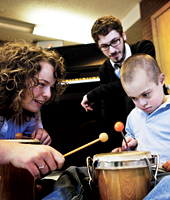The Music of Recovery
New program equips
student musicians to
bring healing and hope

By tapping different rhythms on a drum, SPU juniors and music therapy students Leanne Riddle (left) and
Andy Zook (center) help a child work on his motor skills. |
Before attending Seattle Pacific University, Zach Marsh planned to be a jazz musician and songwriter. And now? “I want to use my music to bring joy to kids struggling with diseases and disabilities,” says the freshman. “Music can bring out hope and help with their recovery.”
Marsh is expanding his understanding of music, especially its nonmusical applications, through SPU’s new music therapy program — the first of its kind in Washington state. Started in 2008, the program currently has seven students enrolled at various levels, from sophomores to seniors. Marsh and 11 other freshmen hope to be accepted into the major at the end of the 2009–10 academic year.
A relatively new field, music therapy came about after World War II as a way to aid recovering soldiers. Today, music therapy is used to heal and help all ages and conditions, from young children with autism to adults recuperating from surgery to elderly people suffering from Alzheimer’s disease. It’s used as part of patient support in hospitals, and as end-of-life relief in hospice centers.
In fact, music therapy offers many career opportunities, with the number of openings for music therapists ex
ceeding the number of qualified candidates. That’s one reason applications are increasing at Seattle Pacific. Another is the program’s national accreditation, which it received in July 2009.
“The American Music Therapy Association is thrilled that we have the major,” says Carlene Brown, assistant professor of music and director of the program. “They’ve wanted a program in Washington for a long time. And it’s a great fit for SPU.”
Music therapy is ultimately about service, a value many of the University’s students and faculty hold in common. “Music therapy requires a high degree of musicianship, but it’s not about performance,” says Brown. “The end goal is healing and hope. It’s not about
personal glory, but about using music for God’s work.”
To do this work, therapists need to be creative and empathetic. For one person, a therapist might need to perform meditative music to reduce stress; for the next person, writing song lyrics to express inner turmoil or tapping a drum to improve motor skills could be the best aid.
Assessing these variables makes for a rigorous academic program, says Brown. Laura Frank, a senior in the program, agrees. “I have a full load each quarter with classes such as ‘Life Span Development Psychology’ and ‘Music and Medicine,’” she says. “It’s somewhat overwhelming, but the program’s been great.”
Frank and her classmates also spend hundreds of hours observing and working with board-certified music therapists out in the field, and they’re required to do a six-month internship after graduation. Says Marsh, “Once you’ve finished, you’re set up to do anything you want as a music therapist.”
— By Reece Carson [reece@spu.edu]
—Photo by Matthew Sumi
Return to top
Back to Campus Home
|